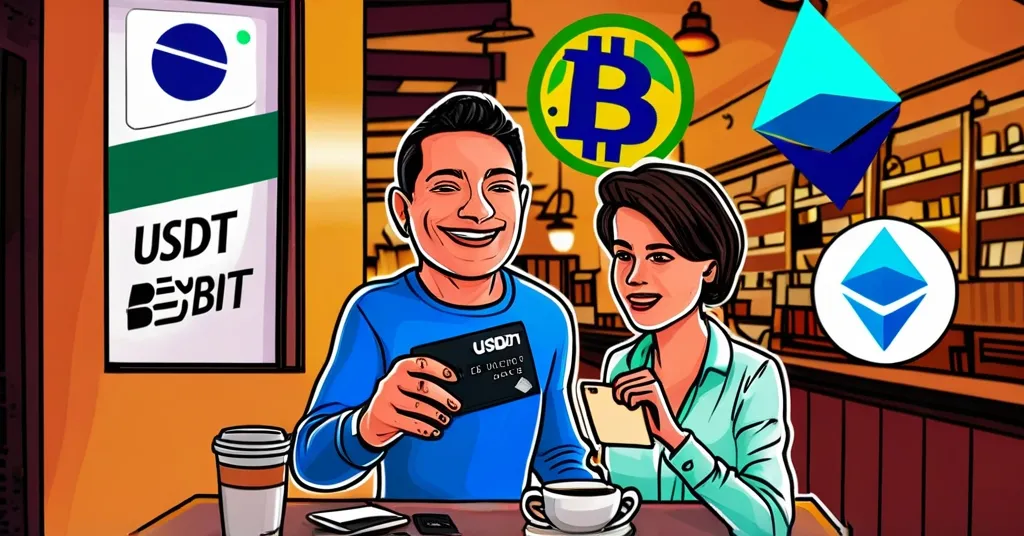Bybit Physical Card in Brazil Boosts Crypto Adoption with 2% Cashback

Bybit Physical Card Launches in Brazil: Enhancing Crypto Payments and Adoption
Bybit introduces the Physical Card in Brazil, enabling crypto payments with USDT, BTC, and ETH, marking a significant step towards integrating digital assets into everyday transactions.
- Bybit launches Physical Card in Brazil
- 2% cashback, supports USDT, BTC, ETH
- No annual fees, integrates with Apple Pay, Google Pay
Ever wondered if you could pay for your morning coffee with Bitcoin? Bybit, the world’s second-largest cryptocurrency exchange by trading volume, now makes this possible with its new Physical Card launched exclusively for Brazilian users. This innovative move aims to bridge the gap between digital assets and daily life, offering a range of benefits to users.
The Bybit Physical Card allows users to spend cryptocurrencies like USDT, BTC, and ETH more easily in everyday transactions. Imagine using USDT with the Bybit Card as if it were a universal gift card that can be instantly converted to cash. The card comes with enticing perks such as a 2% cashback on transactions, no annual or monthly fees, and free issuance and delivery. For added convenience, it integrates seamlessly with Apple Pay and Google Pay, making it easier than ever to use your crypto on the go.
Bybit’s decision to launch the Physical Card in Brazil reflects the country’s growing interest in cryptocurrencies. Data from recent studies show that Brazil is among the top countries for crypto adoption, making it a prime target for such innovations. Since the launch of its virtual card in September, Bybit has witnessed a 3x growth in the number of users, tapping into a vibrant and expanding market. Joan Han, Sales and Marketing Director at Bybit, stated:
“The Bybit Card saw 3x growth in the number of users since our virtual card roll out in September, we are proud to bring our Physical Card to this dynamic community. By offering innovative solutions like the Bybit Card, we aim to empower our users to unlock the full potential of their digital assets.”
To get the Physical Card, Brazilian users must first apply for the Bybit Virtual Card, which serves as a prerequisite. New users can also benefit from a welcome offer by depositing 100 USDT to unlock 150 BRL. Bybit’s focus on Brazil is part of a broader strategy to serve a global community of over 60 million users while advancing the next generation of internet services built on blockchain technology (often referred to as Web3) and the integration of traditional finance (TradFi) with decentralized finance (DeFi).
This initiative aligns with the industry’s trend towards bridging TradFi with DeFi, aiming to create a more open and decentralized financial ecosystem. However, it’s crucial to acknowledge the challenges. The Bybit Physical Card requires more stringent identity verification than a standard Bybit account, and understanding the associated fees and limits is essential for users. Regulatory compliance, security concerns, and the need for user education are significant hurdles that must be addressed for widespread adoption. As one Brazilian user humorously put it, “With Bybit’s Physical Card, you might just start dreaming of buying your groceries with Bitcoin. Just don’t forget to check your wallet’s balance first!”
The launch of the Bybit Physical Card in Brazil could have far-reaching implications for the global adoption of cryptocurrencies. Industry analysts suggest that such moves could pave the way for more countries to embrace digital assets in everyday transactions, leading to a more decentralized and inclusive financial system. Yet, we must remain grounded about the potential risks and limitations, ensuring that the excitement around these innovations doesn’t overshadow the practical realities. The Bybit Physical Card is undoubtedly an exciting development, but it’s just one piece of a much larger puzzle in the world of crypto.
While Bybit’s Physical Card is a leap forward in making cryptocurrencies more accessible, it’s worth considering the broader industry landscape. Bitcoin, often seen as the cornerstone of this revolution, continues to assert its dominance. Yet, altcoins and other blockchains like Ethereum serve vital roles in filling niches that Bitcoin might not. The Bybit Physical Card, supporting a range of cryptocurrencies, exemplifies this diversification and the ongoing effort to disrupt traditional financial systems.
As we champion decentralization, freedom, and privacy, initiatives like the Bybit Physical Card are essential in driving the financial revolution forward. However, we must keep a critical eye on the realities and challenges, ensuring a balanced perspective on the journey towards a more decentralized future.
Key Takeaways and Questions
- What is the Bybit Physical Card?
The Bybit Physical Card is a payment card launched by Bybit exclusively for Brazilian users, allowing them to use cryptocurrencies like USDT, BTC, and ETH for everyday transactions.
- What benefits does the Bybit Physical Card offer?
It offers a 2% cashback reward, supports major cryptocurrencies, comes with no annual or monthly fees, includes free issuance and delivery, integrates with Apple Pay and Google Pay, and potentially offers up to 8% APR on eligible balances.
- Why is Bybit focusing on Brazil?
Bybit is focusing on Brazil to expand its user base and provide user-friendly financial tools that cater to the growing interest in cryptocurrencies within the country.
- What is the prerequisite for obtaining the Bybit Physical Card?
Users must first apply for the Bybit Virtual Card to be eligible for the Physical Card.
- How does Bybit’s launch of the Physical Card in Brazil align with broader industry trends?
It aligns with the trend of integrating traditional finance with DeFi and advancing Web3 technologies, aiming to make cryptocurrencies more accessible and usable in daily life.



